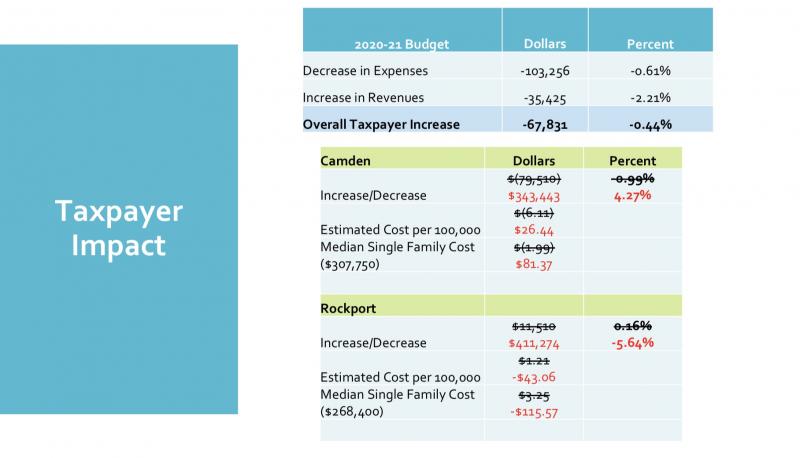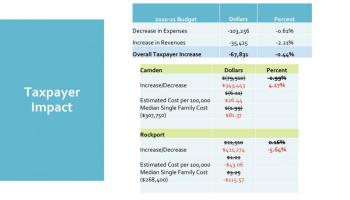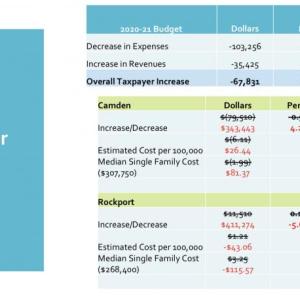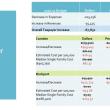Rockport initiates litigation involving Camden and SAD 28 over educational costs
CAMDEN/ROCKPORT — Property tax bills are being sent out this week in Camden, reflecting a mil rate of $15.03 per $1,000 of valuation. Included in the tax bills is the recalculated Camden-Rockport K-8 school charges, which shifts more of the education costs to Camden, and less to Rockport than formerly anticipated. This follows the early August acknowledgement by School Administration District 28 that Rockport has been over-billed for its portion of the Camden-Rockport school district this year, and possibly for more than the past decade.
Meanwhile, Rockport’s Select Board voted Aug. 19 to proceed with filing a complaint following the news last month that SAD 28 has been overcharging Rockport taxpayers.
Whether that complaint is filed against Camden and SAD 28 together remains to be seen, with Rockport Town Manager William Post saying only, “The Town is working with its attorneys regarding a complaint.”
“After executive session on August 19, [Rockport Select Board Chair] Debra Hall moved the Board authorize the Select Board Chair and Vice-chair to coordinate with the Town's attorneys [Portland-based firm Bernstein Shur] to move forward with pursuing the overpayment by Rockport to MSAD 28, including the initiation of litigation,” said Town Manager William Post, Aug. 25. “The motion was seconded by Mark Kelley and approved 5-0.”
Post said Aug. 25: “The Town feels that it prudent to act promptly to protect the Town’s interests but we remain hopeful that we can come to an amicable resolution.”
He said the board is, “protecting the Town's interests regarding the school allocation matter and will be seeking reimbursement for any amounts that Rockport was overcharged.”
He also said that Rockport is keeping the Town of Camden and SAD 28, “informed of any developments.”
The funding formula mistake was discovered this summer, to the effect that this year alone, “A shift of $422,784.40 will increase Camden’s share and lower Rockport’s share,” said Libby, in an Aug. 3 announcement.
The Town of Rockport said it suspected inequities in the funding formula, and Town Manager Post told the Select Board in August: “It is important to note that the error was discovered after inquiries from Rockport staff about the assessment calculation.”
This week, that shift is showing up in Camden’s tax bill, helping to increase the mil rate from $14.91 per $1,000 of valuation in 2019 to this year’s $15.03 per $1,000.
Rockport’s mil rate has yet to be finalized and its tax bills will go out after Camden’s are sent.
To sort out this year’s school funding issue, Suzan Beaudoin, who used to head the School Finance Department at the Maine Department of Education, was retained by SAD 28.
Beaudoin, according to the DOE, retired after 31 years, specializing as the education formula calculator. She started in the department as an accountant for Special Services and went on to hold eight other positions before being named Acting Deputy Commissioner in January.
Her explanation of what went wrong at SAD 28 is compiled in a Power Point presentation (see attached PDF). In it, she reported that Camden’s share is $8.3 million, while Rockport’s is $6.9 million.
In 2020, Camden has 375 students enrolled in SAD 28 and Rockport, 431.
But Beaudoin’s calculation is limited to 2020-2021 only and does not take into account the forensics required to determine how much Rockport has overpaid its portion of school expenses, going back to at least 2009, and possibly earlier.
That billing error, according to SAD 28 Superintendent Maria Libby, is attributed to an incorrect formula used by the district office. While the district has been in existence since 1964, it was after the massive school district reorganization under Gov. John Baldacci, in 2007 that the funding formula was changed.
Apparently, SAD 28 failed to follow the adjusted billing processes, based on property valuation and the total number of each town’s resident pupils.
Camden Town Manager Audra Caler said Aug. 25 that she, Libby and Rockport Town Manager William Post are to meet Sept. 1 to begin the discussion about the inequitable cost sharing, and how to resolve it.
Reach Editorial Director Lynda Clancy at lyndaclancy@penbaypilot.com; 207-706-6657
Event Date
Address
United States





























